Technological Tool Spotlights Interconnected, Fragile World
Published 04.23.2014
News
Events
Natural Science
Faculty & Staff
Communication & Literature
School of Sciences, Humanities & Visual Communications News
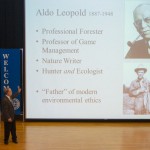
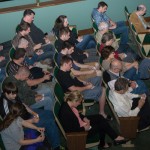
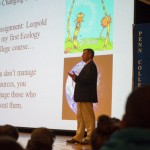
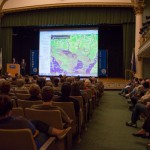
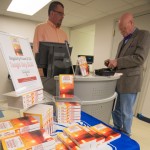 Building on the common ground between distinct specialties, two faculty members challenged audience members Tuesday to discard the exclusionary nature of either/or thinking and find balance between their lives and the world around them. And in so doing, D. Robert Cooley, an assistant professor of anthropology and environmental science, and Mark D. Noe, a professor of English, personified Penn College's cross-disciplinary approach to student learning – where "true education" connects disparate individuals to their shared space. Noe and Cooley presented "Google Meets Aldo Leopold: Information, Technology, and 21st-Century Environmental Ethics," the latest offering in the college's Centennial Colloquia Series. The pair combined resonant readings from Leopold's timeless prose, vocabulary homework and images from Google Earth to lead a "virtual field trip" from the stage of the Klump Academic Center Auditorium. Punctuating Leopold's recognition of the tenuous balance between humans and their environment, the tour presented stark confirmation of man's imprint: residual logging cribs in the West Branch of the Susquehanna River (and remnants of acid mine drainage where it meets the North Branch), air pollution over China, loss of waterfowl habitat in Maryland, and contraction of the Arctic ice cap, among them. The program, introduced by Deb A. Buckman, assistant professor of chemistry/environmental science, was followed by a question-and-answer session and a reception in Wrapture.
Building on the common ground between distinct specialties, two faculty members challenged audience members Tuesday to discard the exclusionary nature of either/or thinking and find balance between their lives and the world around them. And in so doing, D. Robert Cooley, an assistant professor of anthropology and environmental science, and Mark D. Noe, a professor of English, personified Penn College's cross-disciplinary approach to student learning – where "true education" connects disparate individuals to their shared space. Noe and Cooley presented "Google Meets Aldo Leopold: Information, Technology, and 21st-Century Environmental Ethics," the latest offering in the college's Centennial Colloquia Series. The pair combined resonant readings from Leopold's timeless prose, vocabulary homework and images from Google Earth to lead a "virtual field trip" from the stage of the Klump Academic Center Auditorium. Punctuating Leopold's recognition of the tenuous balance between humans and their environment, the tour presented stark confirmation of man's imprint: residual logging cribs in the West Branch of the Susquehanna River (and remnants of acid mine drainage where it meets the North Branch), air pollution over China, loss of waterfowl habitat in Maryland, and contraction of the Arctic ice cap, among them. The program, introduced by Deb A. Buckman, assistant professor of chemistry/environmental science, was followed by a question-and-answer session and a reception in Wrapture.http://www.youtube.com/watch?v=WFTNTrnq220